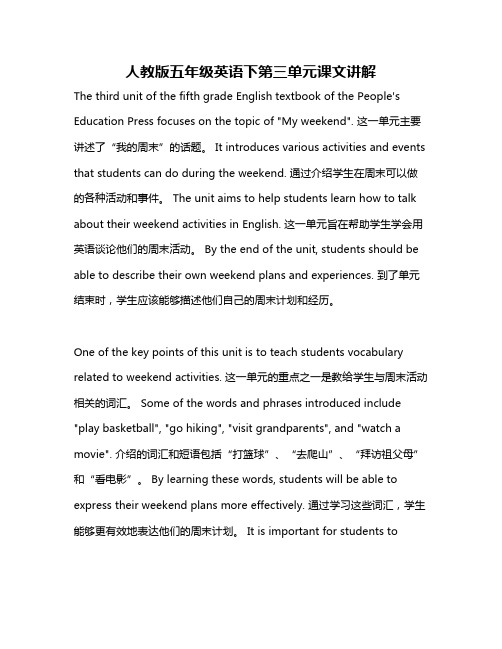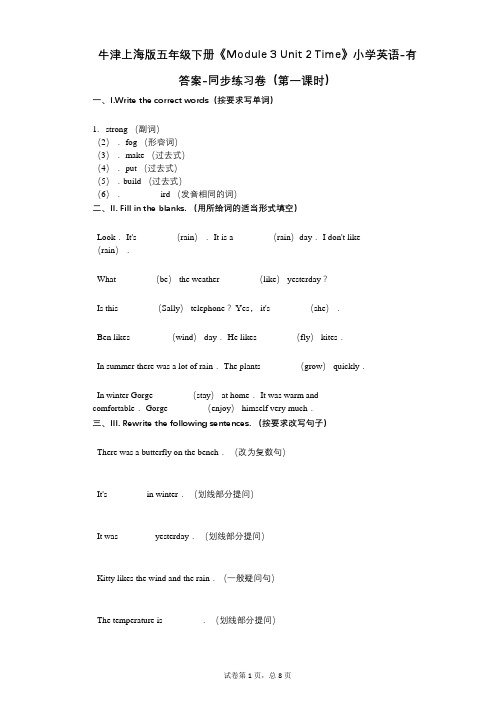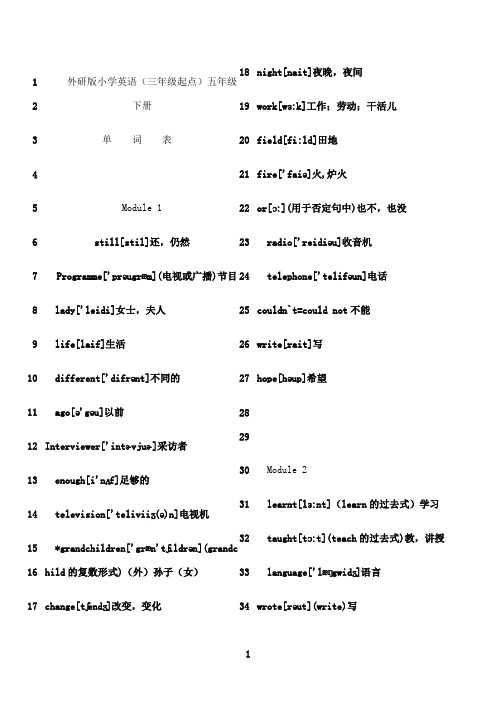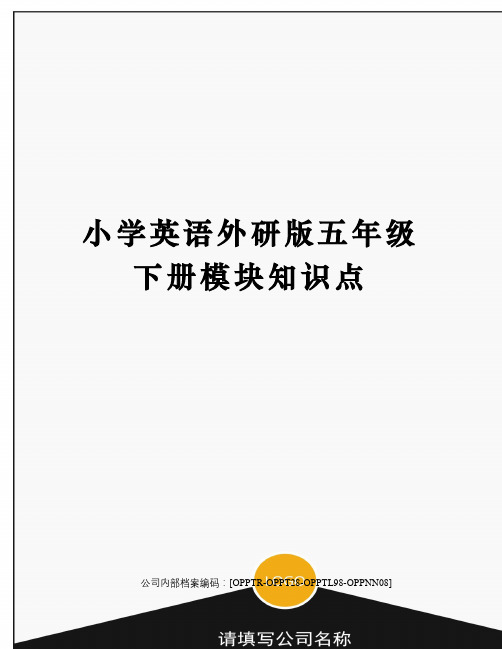最新精选小学英语五年级下册Module 3 Things around usUnit 1 Signs牛津上海版习题精选五十五
人教版五年级英语下第三单元课文讲解

人教版五年级英语下第三单元课文讲解The third unit of the fifth grade English textbook of the People's Education Press focuses on the topic of "My weekend". 这一单元主要讲述了“我的周末”的话题。
It introduces various activities and events that students can do during the weekend. 通过介绍学生在周末可以做的各种活动和事件。
The unit aims to help students learn how to talk about their weekend activities in English. 这一单元旨在帮助学生学会用英语谈论他们的周末活动。
By the end of the unit, students should be able to describe their own weekend plans and experiences. 到了单元结束时,学生应该能够描述他们自己的周末计划和经历。
One of the key points of this unit is to teach students vocabulary related to weekend activities. 这一单元的重点之一是教给学生与周末活动相关的词汇。
Some of the words and phrases introduced include "play basketball", "go hiking", "visit grandparents", and "watch a movie". 介绍的词汇和短语包括“打篮球”、“去爬山”、“拜访祖父母”和“看电影”。
牛津上海版五年级下册《单元 2 Time》同步练习卷(第一课时)

牛津上海版五年级下册《Module 3 Unit 2 Time》小学英语-有答案-同步练习卷(第一课时)一、I.Write the correct words(按要求写单词)1. strong (副词)________(2). fog (形容词)________(3). make (过去式)________(4). put (过去式)________(5).build (过去式)________(6). ________ird (发音相同的词)________二、II. Fill in the blanks. (用所给词的适当形式填空)Look. It's________(rain). It is a________(rain)day. I don't like________ (rain).What________(be) the weather________(like) yesterday?Is this________(Sally) telephone? Yes, it's________(she).Ben likes________ (wind) day. He likes________(fly) kites.In summer there was a lot of rain. The plants________(grow) quickly.In winter Gorge________(stay) at home. It was warm andcomfortable. Gorge________(enjoy) himself very much.三、III. Rewrite the following sentences. (按要求改写句子)There was a butterfly on the bench.(改为复数句)________It's ________ in winter.(划线部分提问)________It was________ yesterday.(划线部分提问)________Kitty likes the wind and the rain.(一般疑问句)________The temperature is ________.(划线部分提问)________四、V.Choose (选择填空)What _____ these signs ______?()A.do; meanB.does, meanC.do , meansWhat's the weather like today? It's _________.()A.the sunB.sunnyC.SundayThe wind is blowing _______.()A.strongB.quickC.stronglyWhat did you have _____ dinner? I had meat and fish.()A.to B.for C.ofWhat was the weather like in autumn? It was _________.()A.hot and wet B.cool and dry C.cold and dry______ did Danny do this morning? _____ a kite()A.What, flyingB.Where, FlewC.What, FlewWhere is the storm coming ________?()A.forB.fromC.of参考答案与试题解析牛津上海版五年级下册《Module 3 Unit 2 Time》小学英语-有答案-同步练习卷(第一课时)一、I.Write the correct words(按要求写单词)1.【答案】strong,foggy,made,put,built,th,three【考点】词性转换同音词一般过去时,动词过去式Things around us: Time【解析】(1)强壮的.(2)雾.(3)制作.(4)放.(5)建筑.(6)第三.【解答】(1)strong.考查词性转换."strong"是形容词又是副词,副词是"strong".(2)foggy.考查词性转换."fog"是名词,形容词是"foggy".(3)made.考查词性转换."make"是实意动词,不规则动词,过去式是"made".(4)put.考查词性转换."put"是不规则动词,过去式是"put".(5)built.考查词性转换."build"是不规则动词,过去式是"built".(6)third.考查词性转换."third"是数词,"th"发音相同的是"three".二、II. Fill in the blanks. (用所给词的适当形式填空)【答案】raining,rainy,rain【考点】单词、词组Things around us: Time【解析】看.天在下雨.今天是一个下雨天.我不喜欢雨.【解答】该题考查单词填空.由look可知该句是现在进行时"am/is/are+doing",rain的现在分词是"raining"."It is a ____(rain)day"中的day是名词,修饰名词应该用形容词形式"rainy".I don't like ____ (rain)句意为"我不喜欢雨",这里的"雨"是名词,故用"rain".故填:raining,rainy,rain.【答案】was,like【考点】单词、词组Things around us: Time【解析】昨天的天气怎么样?【解答】该题考查单词填空.根据原文可知是询问天气的句式:What is the weather like?由时间提示词"yesterday"可知句子的时态为一般过去时,故用is的过去式"was".故答案是:was,like.【答案】Sally's,hers【考点】单词、词组Things around us: Time【解析】这是莎丽的电话吗?是的,是她的.【解答】本题考查单词填空.根据"Is this﹣﹣(Sally) telephone"可知这里修饰名词用所有格形式,即Sally's.而"it's﹣﹣(she)",这里指她的电话,用名词性物主代词hers.故填:Sally's,hers.【答案】windy,flying【考点】单词、词组Things around us: Time【解析】本喜欢有风的天气.他喜欢放风筝.【解答】本题考查单词填空.根据Ben likes﹣﹣(wind) day,这里修饰名词day用形容词形式,所以用windy;而He likes﹣﹣(fly) kites,这里考查like doing sth,表示喜欢做某事.fly的现在分词为flying.故填:windy,flying.【答案】grew【考点】单词、词组Things around us: Time【解析】夏天有很多雨水.植物长得很快.【解答】本题考查单词填空.根据be动词"was"判断句子的时态为一般过去时."The plants﹣﹣﹣(grow)quickly"中谓语动词用过去式形式.grow的过去式为grew.故填:grew.【答案】stayed,enjoyed【考点】单词、词组Things around us: Time【解析】Gorge冬天呆在家里.天气温暖舒适.Gorge非常享受.【解答】本题考查单词填空.根据be动词was判断句子的时态为一般过去时.所以第一个空用过去式stayed,第二个空也用过去式enjoyed.故填:stayed,enjoyed.三、III. Rewrite the following sentences. (按要求改写句子)【答案】There were some butterflies on the bench.【考点】转为单复数句Things around us: Time【解析】板凳上有一只蝴蝶.【解答】本题考查单数句转复数句.题干是There be句型,表示"某地有某物".由be动词was可知句子的时态为一般过去时.was是系动词单数,系动词复数形式是were.a butterfly变为some butterflies.故转为复数句为:There were some butterflies on the bench.【答案】snowy,What's the weather like in winter?【考点】就划线部分提问Things around us: Time【解析】冬天是多雪的.【解答】本题考查特殊疑问句.划线部分是snowy,描述天气的形容词,询问天气怎么样,常用句型:What's the weather like…?提问.故答案为:What's the weather like in winter?【答案】stormy,What was the weather like yesterday?【考点】就划线部分提问Things around us: Time【解析】昨天有暴风雨.【解答】本题考查特殊疑问句.划线部分是stormy,描述天气的形容词,询问昨天天气怎么样,常用句型:What was the weather like yesterday?提问.故答案为:What was the weather like yesterday?【答案】DoesKittylikethewindandtherain?【考点】一般疑问句Things around us: Time【解析】凯蒂喜欢风和雨.【解答】本题考查肯定句转一般疑问句.由动词likes可知句子的时态为一般现在时.likes(喜欢)是实义动词,而且是第三人称单数形式,转一般疑问句时借助动词does协助,does置于句首,首字母大写.动词likes还原为like.句末标点变为问号.故转为的一般疑问句:Does Kitty like the wind and the rain?【答案】28degrees,What is the temperature?【考点】就划线部分提问Things around us: Time【解析】温度是28度.温度是多少?【解答】本题考查特殊疑问句.划线部分是28 degrees(28度),询问温度是多少,用疑问词What提问.根据特殊疑问句的基本结构:What+be动词+主语.be动词是is,主语是the temperature.故答案为:What is the temperature?四、V.Choose (选择填空)【答案】A【考点】助动词Things around us: Time【解析】这些标志是什么意思?【解答】本题考查助动词.题干询问"这些标志是什么意思",句子询问一般事实,时态用一般现在时.mean是一个实义动词,需要加助动词, these signs是复数,一般疑问部分由do引导,后面跟动词原形mean.故选:A.【答案】B【考点】形容词Things around us: Time【解析】今天天气怎么样?天气晴朗.【解答】本题考查形容词的用法.A.the sun太阳;B.sunny晴朗的;C.Sunday星期天.根据"What's the weather like today",可知这里询问天气,放在is后面用形容词形式sunny.故选:B.【答案】C【考点】副词Things around us: Time【解析】风刮得很大.【解答】本题考查副词的用法.A.strong强大的,形容词;B.quick快的,形容词;C.strongly很,副词.根据"The wind is blowing﹣﹣﹣"可知这里修饰动词应用副词形式.故选:C.【答案】B【考点】介词Things around us: Time【解析】你晚饭吃什么了?我吃了肉和鱼.【解答】本题考查介词的辨析.根据What did you have _____ dinner? I had meat and fish.可知这里考查短语for dinner表示为晚餐.故选:B.【答案】B【考点】形容词Things around us: Time【解析】秋天的天气如何?天气凉爽干燥.【解答】本题考查形容词词义辨析.A.hot and wet热和潮湿;B.cool and dry凉爽干燥;C.cold and dry寒冷干燥."What was the weather like in autumn"询问秋天的天气如何,根据常识可知"秋天天气凉爽干燥".故选:B.【答案】C【考点】疑问词组一般过去时,动词过去式Things around us: Time【解析】丹尼今天早上做了什么?放了风筝.【解答】本题考查疑问词的辨析.由问句中的did可知句子的时态为一般过去时.结合题干"___ did Danny do this morning"可推测句意为"丹尼今天早上做了什么",询问做什么,用What提问."放风筝"用英语表达为"Fly a kite",答语要和问句时态保持一致,所以动词fly要用过去式Flew.故选:C.【答案】B【考点】介词Things around us: Time【解析】风暴从何而来?【解答】本题考查介词的辨析.根据Where is the storm coming ﹣﹣,可知句子考查come from 表示来自.故选:B.。
最新外研社小学英语五年级下册(三年级起点)单词表((带音标)

外研版小学英语(三年级起点)五年级1下册2单词表34Module 15still[stil]还,仍然6Programme['prəugræm](电视或广播)节目7lady['leidi]女士,夫人8life[laif]生活9different['difrənt]不同的10ago[ə'gəu]以前11Interviewer['intɚvjuɚ]采访者12enough[i'nʌf]足够的13television['teliviiʒ(ə)n]电视机14*grandchildren['græn'tʃildrən](grandc 15hild的复数形式)(外)孙子(女)16change[tʃendʒ]改变,变化17night[nait]夜晚,夜间18work[wɜ:k]工作;劳动;干活儿19field[fi:ld]田地20fire['faiə]火,炉火21or[ɔ:](用于否定句中)也不,也没22radio['reidiəu]收音机23telephone['telifəun]电话24couldn`t=could not不能25write[rait]写26hope[həup]希望272829Module 230learnt[lɜ:nt](learn的过去式)学习31taught[tɔ:t](teach的过去式)教,讲授32language['læŋgwidʒ]语言33wrote[rəut](write)写34dancer['dɑ:nsə(r)] 舞蹈演员35foreign['fɔrən]外国的36studied['stʌdid](study的过去式)学习37hard[hɑ:d]努力地383940Module 341hamburger['hæmbɜ:gə(r)]汉堡42English['iŋgliʃ]英国(式)的43breakfast['brekfəst]早餐,早饭44lunch[lʌntʃ]午餐,午饭45sandwich['sænwitʃ]三明治46fish and chips炸鱼加炸薯条47traditional[trə'diʃənl]传统的48dish[diʃ]食品;菜肴49very much['veri mʌtʃ]很,非常50gave[geiv](give的过去式)给51tonight[tə'nait]今夜,今晚525354Module 455library['laibrəri]图书馆56student['stju:dnt]学生57sent[sent](send的过去式)发送,寄58*CD 激光唱片,光盘59idea[ai'diə]主意,想法60put[put]放,安放61*shelf[ʃelf]架子62heavy['hevi]重的,沉的63dictionary['dikʃənri]词典;字典64card[kɑ:d]卡片65library card图书卡,借书证66ask[ɑ:sk]邀请67wrong[rɔ:ŋ]错误的68dear[diə(r)]哎呀69information[ˌinfə'meiʃn]信息70*e-book电子书71project['prɔdʒekt][项目72guide[gaid]介绍,指南,手册73film[film]电影74as well又,还,也75way[wei]方法,方式76on[ɔn]关于77*topic['tɔpik]话题787980Module 581light[lait]轻的82hard[hɑ:d]困难的,费力的83*broken['brəukən]坏的,破的84department store[di'pɑ:tmənt stɔ:]百85货商86店87pocket['pɔkit]口袋,兜88umbrella[ʌm'brelə]雨伞89sales assistant[seilz ə'sistənt]]售货90员,营业员91wheel[wi:l]轮子92easy['i:zi]容易的,不费力的93take[teik]选择要,选择购买94too[tu:]太,过于95try[trai]试,尝试96lovely['lʌvli]美丽的,可爱的;令人愉97快的9899100Module 6101moon[mu:n]月亮,月球102get[ɡet]到达103west[west]西,西部,西方;向西方104parent['peərənt]母亲;父亲;家长105stay[stei]停留106July[dʒu'lai]七月107south[sauθ]南,南部,南方;向南方108remember[ri'membə(r)]记得109June[dʒu:n]六月110east[i:st]东,东部,东方;向东方111best[best]最好的112north[nɔ:θ]北,北部,北方;向北方113rest[rest]休息114have a rest休息一下115rode[rəud](ride的过去式)骑116117118Module 7119evening['i:vniŋ]傍晚,晚上120late[leit]近日暮的;近深夜的;时间不早121的122 worker['wɜ:kə(r)]工人123factory['fæktri]制造厂;工厂124early['ɜ:li]早的125taxi['tæksi]出租车,计程车126quarter['kwɔ:tə(r)]一刻钟127to[tu,tə](距整点)差......128worry['wʌri]焦虑,担心129130131Module 8132paper['peipə(r)]纸133Chinese[ˌtʃai'ni:z]中国人的134so[səʊ]如此,这样135word[wɜ:d]词,字136drew[dru:](draw[drɔ:]的过去式)画137cut[kʌt](cut的过去式)剪,切,割138piece[pi:s]张,片,块139paint[peint](用颜料)绘画,着色140put[put](put的过去式)放,安放141stick[stik]小木棍,小木条142tied[taid](tie的过去式)扎上,系上143*string[striŋ]线,绳子144145146Module 9147laugh[lɑ:f]笑148wore[wɔ:(r)](wear[weə(r)]的过去式)穿149letter['letə(r)]信,书信150theatre['θiətə]剧院151women['wimin](woman['wumən]的复数形152式)女性,妇女153actor['æktə(r)]演员154told[təuld](tell[tel]的过去式)口述,155讲(故事等)156joke[dʒəuk]笑话157 after['ɑ:ftə(r)]在……以后158show[ʃəu](尤指剧院的)演出,表演159restaurant['restrɔnt]饭店,餐馆160read[ri:d](read的过去式)读161at all[æt ɔ:l]一点都162in[in]在(将来一段时间)之后163another[ə'nʌðə(r)]另一个164history['histri]历史165ask[ɑ:sk]问,询问166question['kwestʃən]问题167forget[fə'get]忘,忘记168bring[briŋ]带来,拿来169soon[su:n]不久,很快170171172Module 10173when[wen]在什么时候174end[end]结束,终止175176nervous['nɜ:vəs]紧张的,情绪不安的177all right[ɔ:l rait]没事,没问题178airport['eəpɔ:t]机场179ticket['tikit]票180passport['pɑ:spɔ:t]护照181safe[seif]安全的,平安的182pet[pet]宠物183speak[spi:k]说,讲building['bildiŋ]建筑物184185American[ə'merikən]美国的;美国人的;美国人186187find out[faind aut]发现,弄清188more[mɔ:(r)]更多的(量),较多的(量)。
外研社小学英语五年级下册(三年级起点)单词表((带音标)

外研版小学英语(三年级起点)五年级下册单词表Module 1still[stil]还,仍然Programme['pr?ugr?m](电视或广播)节目lady['leidi]女士,夫人life[laif]生活different['difr?nt]不同的ago[?'g?u]以前Interviewer['int?vju?]采访者enough[i'n?f]足够的television['telivii?(?)n]电视机*grandchildren['gr?n't?ildr?n](grandchild的复数形式)(外)孙子(女)change[t?end?]改变,变化night[nait]夜晚,夜间work[w?:k]工作;劳动;干活儿field[fi:ld]田地fire['fai?]火,炉火or[?:](用于否定句中)也不,也没radio['reidi?u]收音机telephone['telif?un]电话couldn`t=could not不能write[rait]写hope[h?up]希望Module 2learnt[l?:nt](learn的过去式)学习taught[t?:t](teach的过去式)教,讲授language['l??gw id?]语言wrote[r?ut](write)写dancer['dɑ:ns?(r)] 舞蹈演员foreign['f?r?n]外国的studied['st?did](study的过去式)学习hard[hɑ:d]努力地Module 3hamburger['h?mb?:g?(r)]汉堡English['i?gli?]英国(式)的breakfast['brekf?st]早餐,早饭lunch[l?nt?]午餐,午饭sandwich['s?nwit?]三明治fish and chips炸鱼加炸薯条traditional[tr?'di??nl]传统的dish[di?]食品;菜肴very much['veri m?t?]很,非常gave[geiv](give的过去式)给tonight[t?'nait]今夜,今晚Module 4library['laibr?ri]图书馆student['stju:dnt]学生sent[sent](send的过去式)发送,寄*CD 激光唱片,光盘idea[ai'di?]主意,想法put[put]放,安放*shelf[?elf]架子heavy['hevi]重的,沉的dictionary['dik??nri]词典;字典card[kɑ:d]卡片library card图书卡,借书证ask[ɑ:sk]邀请wrong[r?:?]错误的dear[di?(r)]哎呀information[?inf?'mei?n]信息*e-book电子书project['pr?d?ekt][项目guide[gaid]介绍,指南,手册film[film]电影as well又,还,也way[wei]方法,方式on[?n]关于*topic['t?pik]话题Module 5light[lait]轻的hard[hɑ:d]困难的,费力的*broken['br?uk?n]坏的,破的department store[di'pɑ:tm?nt st?:]百货商店pocket['p?kit]口袋,兜umbrella[?m'brel?]雨伞sales assistant[seilz ?'sist?nt]]售货员,营业员wheel[wi:l]轮子easy['i:zi]容易的,不费力的take[teik]选择要,选择购买too[tu:]太,过于try[trai]试,尝试lovely['l?vli]美丽的,可爱的;令人愉快的Module 6moon[mu:n]月亮,月球get[ɡet]到达west[west]西,西部,西方;向西方parent['pe?r?nt]母亲;父亲;家长stay[stei]停留July[d?u'lai]七月south[sauθ]南,南部,南方;向南方remember[ri'memb?(r)]记得June[d?u:n]六月east[i:st]东,东部,东方;向东方best[best]最好的north[n?:θ]北,北部,北方;向北方rest[rest]休息have a rest休息一下rode[r?ud](ride的过去式)骑Module 7evening['i:vni?]傍晚,晚上late[leit]近日暮的;近深夜的;时间不早的worker['w?:k?(r)]工人factory['f?ktri]制造厂;工厂early['?:li]早的taxi['t?ksi]出租车,计程车quarter['kw?:t?(r)]一刻钟to[tu,t?](距整点)差、、、、、、worry['w?ri]焦虑,担心Module 8paper['peip?(r)]纸Chinese[?t?ai'ni:z]中国人的so[s??]如此,这样word[w?:d]词,字drew[dru:](draw[dr?:]的过去式)画cut[k?t](cut的过去式)剪,切,割piece[pi:s]张,片,块paint[peint](用颜料)绘画,着色put[put](put的过去式)放,安放stick[stik]小木棍,小木条tied[taid](tie的过去式)扎上,系上*string[stri?]线,绳子Module 9laugh[lɑ:f]笑wore[w?:(r)](wear[we?(r)]的过去式)穿letter['let?(r)]信,书信theatre['θi?t?]剧院women['wimin](woman['wum?n]的复数形式)女性,妇女actor['?kt?(r)]演员told[t?uld](tell[tel]的过去式)口述,讲(故事等)joke[d??uk]笑话after['ɑ:ft?(r)]在……以后show[??u](尤指剧院的)演出,表演restaurant['restr?nt]饭店,餐馆read[ri:d](read的过去式)读at all[?t ?:l]一点都in[in]在(将来一段时间)之后another[?'n?e?(r)]另一个history['histri]历史ask[ɑ:sk]问,询问question['kwest??n]问题forget[f?'get]忘,忘记bring[bri?]带来,拿来soon[su:n]不久,很快Module 10when[wen]在什么时候end[end]结束,终止nervous['n?:v?s]紧张的,情绪不安的all right[?:l rait]没事,没问题airport['e?p?:t]机场ticket['tikit]票passport['pɑ:sp?:t]护照safe[seif]安全的,平安的pet[pet]宠物speak[spi:k]说,讲building['bildi?]建筑物American[?'merik?n]美国的;美国人的;美国人find out[faind aut]发现,弄清more[m?:(r)]更多的(量),较多的(量)。
小学英语外研版五年级下册模块知识点

小学英语外研版五年级下册模块知识点公司内部档案编码:[OPPTR-OPPT28-OPPTL98-OPPNN08]Module 1 Unit 1重点句子:1.She was young in this picture.她在这张照片里很年轻.否定句:She wasn’t young in this picture.一般疑问句:Was she young in this picture2. She was a driver before.她以前是一个司机.否定句:She wasn’t a driver before.一般疑问句:Was she a driver before肯定回答:Yes, she was. / No, she wasn’t.就划线部分提问:What was she before3.He played Chinese music.他演奏中国音乐.否定句:He didn’t play Chinese music.一般疑问句:Did he play Chinese music肯定回答:Yes, he did. / No, he didn’t.就划线部分提问:What music did he play4.I can play the flute, too. = I can also play the flute.我也会演奏笛子.5. She drove a bus.她开公共汽车.就划线部分提问:What did she drive6. He teaches us English.他教我们英语.就划线部分提问:What does he teach us7. She helped children.她帮助了孩子们.就划线部分提问:What did she do重点单词:1. grandma2. picture祖母,奶奶图片,照片3. player 玩家,演奏者,运动员,演员Module 1 Unit 2重点句子:1.My grandpa worked in an office.他在办公室工作.否定句:My grandpa didn’t work in an office.一般疑问句:Did your grandpa work in an office肯定回答:Yes, he did. / No, he didn’t.就划线部分提问:Where did your grandpa work2.My mother works in a hospital.我(de)妈妈在医院上班.否定句:My mother doesn’t work in a hospital.一般疑问句:Does your mother work in a hospital 肯定回答:Yes, she does. / No, she doesn’t.就划线部分提问:Where does your mother work3.My parents work in a factory否定句:My parents don’t work in a factory.一般疑问句:Do your parents work in a factory肯定回答:Yes, they do. / No, they don’t.就划线部分提问:Where do your parents work4.There were no computers like there are today.过去不像今天这样,有电脑.5. I was a teacher before.就划线部分提问:What were you before重点单词和短语:1. office2. factory3. hospital办公室工厂医院4. parents 6. shop 7. in the sun父母商店在阳光下very hard工作非常努力Module 2 Unit 1重点句子:1.I’ve got an email from Lingling. 我收到玲玲发(de)一封电子邮件.2.It’s about English food. 它是关于英国食物(de).3.Yesterday she had an English breakfast. 昨天她吃了一顿英国式早餐.4.She had eggs and sausages for breakfast. 她早餐吃了鸡蛋和香肠.否定句:She didn’t have eggs and sausages.一般疑问句:Did she have eggs and sausages肯定回答:Yes, she did. / No, she didn’t.就划线部分提问:What did she have for breakfast5.It’s a traditional English dinner. 它是一顿传统(de)英国式晚餐.6.She says it’s delicious.否定句:She doesn’t say it’s delicious.一般疑问句:Does she say it’s delicious肯定回答:Yes, she does. / No, she doesn’t.就划线部分提问:What does she say重点单词:1. email2. food3. breakfast4. lunch电子邮件食物(不可数)早餐午餐5. dinner6. sausages7. sandwiches8. chips晚餐香肠三明治薯条9. traditional 10. delicious 11. different传统(de)好吃(de)不同(de)Module 2 Unit 2重点句子:1.English people usually have breakfast at seven o’clock. 英国人通常在7点钟吃早餐.就划线部分提问:What time do English people usually have breakfast2.Sundays are special in England. 在英国每周日是很特别(de).3.Families usually eat lunch together. 家人们通常一起吃午餐.4.They eat chicken, potatoes and vegetables. 他们吃鸡肉,土豆和蔬菜.5.On Fridays, many people eat fish. 在每个周五,许多人吃鱼.6.He has dinner at half past twelve.就划线部分提问:What time does he have dinner7.She has biscuits and noodles.What did she have重点单词:1. England2. usually3. special4. families英国通常特别(de) family(de)复数5. together6. chicken7. potatoes8. vegetable一起鸡,鸡肉 potato(de)负数蔬菜9. want to do sth.想要做某事.10.food食物/ meat肉/ fish鱼肉/ chicken鸡肉这几个词都是不可数名词.Module 3 Unit 1Wordsreturn 归还 computer计算机,电脑 like 喜欢card 卡片,名片 week 星期,周video 录像,视频 shelf架子library 图书馆favourite 特别喜欢(de) return 归还Phrasein China 在中国 on the computer 在电脑上at the library 在图书馆in two weeks 在两周内 library card 借书卡 on shelf 在书架上lend…to… 把…借给…borrow…from… 从…借入本课语法点1. have got/haven’t gothave got是表示“有”(de)意思;什么时候用have got,什么时候用has got 取决于主语,如果主语是第三人称单数,就用has got,其它(de)就用have got.如果要对have/has got表示否定,只须在have/has后加上not即可,have not可以缩写成haven’t;has not可以缩写成hasn‘t.2.Have…got /Yes/NoHave got(de)—般疑问句是: Have/Has sb got…如: Have you got a sandwich你有一块三明治吗具体是用have还是用has就由sb(de)人称决定. Have you got…是—般疑问句,回答要用yes和no.Module 3 Unit 2Wordsborrow 借入;借来zoo动物园 wear 穿着bookshop 书店 school 学校 talk 谈话,讲话hear 听说,听到park 公园 friend 朋友type n.类型,品种 v.打字Phraselots of 很多,大量 talk to sb. 对某人说话use the computer 使用电脑 borrow books借书do your homework 做你(de)家庭作业English libraries 英国(de)图书馆in a library 在一个图书馆 so much 如此多talk to your friends 和你(de)朋友们交谈lots of stories 很多故事本课语法点1. can/can’tcan是情态动词,这里表示“能,会”(de)意思,用来表示能力,后面接上动词原形,这一点同学们要记住哦.情态动词“can“可以用来表示“会……”,can‘t表示“不会……”(de)意思.2. 学习部分介词(de)用法with是介词,可以表示“用”(de)意思;with还有“和…一起”(de)意思.with后面可以加工具类(de)名词,例如:Cut it with a knife.(用刀切开它.)工具、器具、材料类(de)名词都和with这个介词搭配,表示“用(某种工具)……”.介词for后面接某人,表示动作(de)对象或者接受者,意思是“给……”、“对……(而言)”.当我们表达几点钟(de)时候,我们必须用at.“in”和“at”(de)区别:在英语中at和in都可以作为表示场所(de)介词,但是at表示某地点(表示比较小或狭窄(de)场所),而in表示在某地(表示比较大或宽敞(de)场所)Module 4 Unit 1Wordsfine(身体)很好 sent (send(de)过去式)寄get 收到;接到chocolate 巧克力read 读game游戏 ate (eat(de)过去式)delicious 美味(de) America 美国Phrasecome to 来到 live in 在……居住 last week 上星期a Maths game 一个数学游戏English books 英语书my chocolate 我(de)巧克力 send you 寄给你some books 一些书 this summer 这个夏天本课语法点1.Did…一般过去时(de)一般疑问句.一般疑问句中要用到助动词did,把did提至句首,其他句子结构保持不变.另外,一般疑问句中(de)行为动词也要用原形表示.—般过去时一般疑问句(de)回答.用Yes,…/N0,…来回答,助动词要用did,以保证问句答句时态一致.2.宾格it/them人称代词(de)宾格有:me,us,you,her,him,it,them等.宾格用在动词和介词之后.Module 4 Unit 2Wordsseason 季节 birthday 生日 winter冬天spring 春天 summer 夏天July七月August 八月leaf 树叶 temperature温度,体温 autumn 秋天 sandal 凉鞋 wood 木头,木材glove手套 breeze 微风Phrasefavourite season 最喜爱(de)季节smell good 闻起来味道很好 in the sky 在天空中go swimming 去游泳 play with玩…..,和……一起玩a breeze 一阵微风 fall off 从……跌落in the wood 在树林里 on the tree 在树上(长在树上)in the tree 在树上(不长在树上)the baby ducks 小鸭子们本课语法点1.What is…favorite…What’s your favorite… 这个句型可以用来询问别人最喜欢(de)东西是什么. 2.季节(de)学习3.When…when是特殊疑问词,等于what time,是用来提问时间.what time只用于询问钟点,而when可以用来询问日期、钟点、星期几等.Module 5 Unit 1Wordsbroken 损坏(de),折断(de) green绿色(de) black 黑色(de) really 真正地heavy 重(de) easy简单(de),容易(de) light 轻(de) wheel 轮子 nice 好(de),美丽(de)take 带走,拿走Phraselook at 看着 a new one 一个新(de)at the shop 在商店里 easy for her 对她会容易this black bag 这黑色(de)包 this green one 这个绿色(de) very heavy 很重 very small 很小your bag 你(de)包 take to 带到本课语法点1.学习形容词broken/new/heavy/light2.学习颜色类(de)词汇3. Be + adj.for sb.good for sb(de)两个解释:l.对某人有好处.2.(表示祝贺)干得好.sth is good/bad for sb:某事物对某人有好/坏处.Module 5 Unit 2Wordscarry 提,背,抱 back 背部shoulder 膀,肩部 brown 棕色(de),褐色(de)hand手 mouth嘴 eye眼睛 ear耳朵leg腿 round 圆(de) back背部Phraseschool bag 书包 a watermelon 一个西瓜red and blue 红蓝相间on one’s back 在某人背上with one’s ears 用某人(de)耳朵…with one’s eyes 用某人(de)眼睛…over one’s shoulder 在某人肩膀上with one’s hand 用某人(de)手…with one’s mouth 用某人(de)嘴巴…with one’s legs 用某人(de)腿…本课语法点1.感官动词2. see/hear/eat/walk with…表示听觉(de)时候,我们通常用到(de)动词是listen和hear,它们都是“听”(de)意思.表示触觉(de)时候我们主要用到feel和touch这两个动词,它们都是“触摸”(de)意思.表示嗅觉(de)时候,我们通常用smell这个动词,它(de)意思是“闻”.表示味觉(de)时候,我们常用taste这个动词,它(de)意思是“品尝”.表示视觉(de)单词主要是look和see,这两个单词都是“看”(de)意思.表示感觉(de)感官动词:see(看见),hear(听见)等,这些词是没有进行时态(de).with后面(de)名词可以是身体上(de)某个部位,通常和感官动词连用.Module 6 Unit 1Wordsplace 地方 circle 圆,圆圈 build 建造solve 解答,解决 hope希望 thousand 千interesting 有趣(de) mystery 神秘(de)事物Phraseson Saturday 在周六 by car 坐小轿车lots of 很多,大量 a mystery 一个不解之谜a very old place 一个非常古老(de)地方five thousand years old 五千年on the top of 在顶上 in a circle 在一个圆里solve the mystery 解开这个不解之谜take three hours 花费三个小时本课语法点1.一般将来时willwill作动词,意思是“将”,表示将来发生(de)事情.一般将来时(de)结构为:主语+will+动词原形,其中当主语为第一人称时也可以表达为: I/we+shall+动词原形.一般将来时(de)否定句是在will后面加not,will not=won‘t 有will(de)一般将来时(de)句子,常常与表示将来(de)时间状语连用,例如:tomorrow明天, next time下一次,this Sunday这个周日等.there be句型是“有,存在”(de)意思.它(de)一般将来时可以用there will be来表示.2. be going to/will3. will(de)特殊疑问句一般将来时(de)疑问句是把Will/shall放在主语前面. Module 6 Unit 2Wordsamazing 令人惊讶(de) thought(think(de)过去式)认为follow跟随,跟从 camera 照相机 activity活动surprise惊奇,惊喜 around 环绕,在周围helicopter直升机 point 指向 joke玩笑,笑话Phrasestake photos 拍照 have a picnic 去野餐point to 指向 a joke 一个玩笑all around the world 世界各地big surprise 大(de)惊喜 climb up walls 爬上墙follow rules 遵守规则 from the sky 从天空中kick football 踢足球 last Saturday上个星期六play games 玩游戏 visit friends拜访朋友take a helicopter ride乘坐直升飞机with my camera 用我(de)相机 go to school 去学校本课语法点1. all around the world2.介词(de)学习“think about”,意思是思考,考虑.over可以作为方位介词使用,它(de)意思是“在……上面(但不接触到)”.on表示“在……上面”,强调与某物体有接触.over也可以表示方位,强调在某人或某物(de)正上方,而且两物体表面没有接触.up有向上(de)含义.来看表示处所方位(de)介词:at/in/on都表示“在…”,at 表示“在…内”,用于内部;on意为“在…上面”,用于表面接触.表示在某地时,at后接小地方,in后接大地方.with后面可以加工具类(de)名词,例如:Cut it with a knife.(用刀切开它.)工具、器具、材料类(de)名词都和with 这个介词搭配,表示“用(某种工具)……”.Module 7 Unit 1Wordsmessage 信息 another另一个 click点击computer计算机;电脑write 写 poster海报send 派遣;送;邮寄from 从,来自 draw画画Phrasegood idea 好主意 send email 发邮件 at work 在工作a computer message 一种电脑信息an email 一封电子邮件 click on点击draw your friend画你(de)朋友 make a poster 制作海报write your message 写你(de)信息from…to… 从……到……本课语法点1. give sth to sbgive意思是“给”,表示给某人时,要加介词to.2. another(de)用法another是“另一个,再一个”(de)意思.one表示“一个”,another泛指“另一个”;两个中(de)“另一个”是the other;不定数目中(de)“另一个”是another.3.from…to…from…to…,是从……到……(de)意思.Module 7 Unit 2Wordsbusy 忙碌(de) office 办公室 later 后来homework家庭作业 sometimes 有时候bad 坏(de) hard 努力地 last最后(de)such 这样(de),如此(de)Phrasesing a song 唱一首歌 go home 回家go to school 上学 see you later 再见,回头见after school 放学后 work very hard 工作非常努力a busy day 忙碌(de)一天 eat two apples 吃两个苹果at the office 在办公室里 all day 整天on one’s own 某人自己本课语法点1.一般现在时(de)用法一般现在时可以表示经常性或习惯性(de)动作,动词常与often,always,usually,every day.sometimes,now and then等时间状语连用.瞬间动词find(找到),wake(醒),die(死)等,这些表示一瞬间发生(de)动作(de)词语是没有进行时态(de).表示态度、感情和心理状态等(de)动词.like(喜欢),love(爱),know(知道),hate(恨这些词都是没有进行时态(de).2. it is time for sb to doIt’s time to do sth/It’s time for sth=是做某事(de)时候了.3. so(de)用法so可以用作程度副词,意思是“很,非常”.Thank you so much. 非常感谢.Module 8 Unit 1Wordspresent 礼物 dragon 龙 windy 多风make 制作,做 great 杰出(de),了不起(de)cousin 堂(表)兄弟/妹 chopsticks 筷子so 这么,那么PhraseOf course. 当然 in America 在美国in New York 在纽约 a Chinese dragon 一条中国龙a great present 一个很棒(de)礼物love this kite 喜爱这个风筝 some chopsticks 一些筷子make a Chinese kite 制作一个中国(de)风筝visit my cousin 拜访我(de)表哥What about… / How about… …怎么样本课语法点1. Will(de)一般疑问句及问答一般将来时(de)疑问句把will/shall放在主语前面.“will the rabbit+动词原形…(……将会……)”肯定回答“Yes,it will.”;否定回答“N0, it won’t.”2.think / I think…I think后面是一个完整(de)句子作宾语,这样(de)句子称为宾语从句.Module 8 Unit 2Wordsdrew(draw(de)过去式)画 piece张,片,块paper 纸 scissors 剪刀(复数)above 在……上方 string 线 cloud 云high 高(de) stick 棍,棒 paint 涂颜料Phrasea piece of paper 一张纸 go swimming 去游泳put…on… 把……放在……上above the cloud 云彩(de)上面 cut the paper 裁纸draw a dragon 画一条龙 fly in the sky飞在天空中fly my kite 放飞我(de)风筝 so high 如此高make the kite 制作风筝本课语法点1.介词above(de)用法above是介词,意思是.在…上面.above强调位置在某物体(de)上方,并不一定是正上方,而且两物体表面也没有接触.above/over/on表示“在…上面”.“above”(de)意思是“在…之上”,表示相对高度,不一定是在正上方,其反义词below.2.疑问词how(de)学习how引导疑问旬时意为“怎样,如何”等,是询问方式.比如.可以用how来询问对方或他人如何到达某地.A:How do you get to school你是怎么到校(de)B:I walk to school我不行到校(de).How也可以用来询问天气.How is the weather today / What’s the weather like today今天(de)天气怎么样。
上海牛津版英语小学一年级1BM3U2(5)

Module 3 Things around usUnit 2 Weather (1)Ⅰ. Look and circle〈根据所给的单词,把正确的单词部分圈出来〉:1. weather2. rainy3. how4. the5. cloudy6. sunnyⅡ. Look and number〈看图,将单词的编号写在相应的图片下〉:1. rainy2. cloudy3. sunny4. windy ( ) ( ) ( ) ( ) w e a w e a t h e rr a i n r a i n y yh o m n o w h o w wt h a t h e r t h uc l o u c l o ud ys u n n s u n n y yⅢ. Read and match1. How is the weather? It’s sunny.●●A.2. How is the weather? It’s cloudy. ●●B.3. How is the weather? It’s windy. ●●C.4. How is the weather? It’s rainy. ●●D.5. How is the weather? It’s hot. ●●E.Ⅳ. Read and judge〈判断下列句子是否符合所给的情景,用☺或☹表示〉:1.想知道天气情况,你问:How is the weather?2.今天是下雨天,你说:It’s a sunny day.3.别人问你是否喜欢晴天,你说:Yes, I like rainy days.4.早晨,看见好朋友,你对好朋友说:Good afternoon..5.想邀请朋友去公园,你说:Let’s go to the park.Module 3 Things around usUnit 2 Weather (2)Ⅰ. Read and circle 〈读一读,圈出在意义上属于不同类的单词〉: 1. 2. 3. 4.Ⅱ. Read and tick 〈读句子,在相应的图片下打勾〉:1. It ’s summer. It ’s hot.A. ( )B. ( )2. Do you like windy days? No.A. ( )B. ( )3. It ’s summer. It ’s hot.A. ( )B. ( )4. Let ’s go to the beach.A. ( )B. ( )5. Do you like cloudy days? Yes.A. ( )B. ( ) A. how B. cowC. cat A. sunny B. weather C. rainy A. is B. are C. can A. beach B. peach C. appleⅢ. Look and choose〈看图,选出正确的单词,圈在字母代号上〉:1. 2. 3. 4. 5.A. rainy A. morning A. peach A. sunny A. AliceB. sunny B. afternoon B. beach B. cloudy B. KittyⅣ. Read and judge〈判断下列句子是否符合图意,用√或╳表示〉:1. 2.It’s a rainy day. ( ) Do you like cloudy days? Yes. ( ) 3. 4.Good afternoon. ( ) Do you like windy days? Yes. ( ) 5. 6.It’s spring. It’s warm. ( ) Is it a cloudy day? Yes. ( )Ⅴ. Read and judge〈阅读对话,按顺序用“1—4”给下列图片编号〉:1. Alice: Mum, how is the weather? Mum: It’s windy.2. Alice: Mum, is it sunny? Mum: No, it’s cloudy.3. Alice: Do you like sunny days? Mum: Yes, It’s nice.4. Alice: How is the weather? Mum: It’s rainy. Take an umbrella, please.Module 3 Things around usUnit 2 Weather (3)Ⅰ. Read and circle〈读一读,圈出正确的图片〉:1. 2.sunny summerA. B. A. B.3. 4.windy rainyA. B. A. B.5. 6.warm cloudyA. B. A. B.Ⅱ. Read and number〈读句子,在相应的图片下编号〉:1. --- How is the weather?2. --- How is the weather?--- It’s sunny. --- It’s cloudy.3. --- How is the weather?4. --- How is the weather?--- It’s rainy. --- It’s windy.Ⅲ. Look and circle〈看图,圈出适当的单词完成句子,圈在字母代号上〉:1. Let’s go to the ____________.A. peachB. beach2. How __________ the weather? It’s ho t.A. isB. are3. It’s a __________ day.A. rainyB. sunny4. Do you like windy days? ___________.A. YesB. No5. Is it a __________ day? Yes.A. cloudyB. windyⅣ. Read and choose〈读一读,选择正确的问句或答句,将字母代号写在前面的括号内〉:A. It’s summer. It’s hot.B. Yes, I like sunny days.C. I see the red sun.D. It’s sunny. It’s hot.E. I like hot days.( ) 1. --- How is the weather? --- _____________________( ) 2. --- Do you like sunny days? --- _____________________( ) 3. --- What do you like? --- _____________________( ) 4. --- What do you see? --- _____________________( ) 5. --- What season is it? --- _____________________Module 3 Things around usUnit 2 Weather (4)Ⅰ. Look and circle〈根据所给例词,在每行中找出一个,并把它圈出来〉:1. season2. weather3. how4. rain5. morningr a i m r a r a i nw e w e a t h e r rm o r n i n g i n gh o m n o w h o w hs e e s e a s o n sⅡ. Look and match〈看图,将下列图片与相应的句子连线〉:1.● ● A. Is it a rainy day? Yes.2.● ● B. How is the weather? It’s windy.3.● ● C. It’s summer, a hot day. ays.4.● ● D. Do you like sunny days? Yes.5.● ● E.No, I like cloudy day.Ⅲ. Read and tick〈看图,在符合要求的句子前打√〉:1. 2.( ) A. Do you like rainy days? Yes. ( ) A. How is the weather? It’s hot. ( ) B. Do you like rainy days? No. ( ) B. How is the weather? It’s cold.3. 4.( ) A. It’s a cloudy day. ( ) A. How is the weather? It’s sunny. ( ) B. It’s a windy day. ( ) B. How is the weather? It’s rainy.Ⅳ. Read and choose〈读一读,选择合适的应答句,将字母代号写在前面的括号内〉:( ) 1. What do you see? A. It’s hot. It’s big. I like the sun. ( ) 2. How is the sun? B. Yes, I eat ice cream.( ) 3. How is the weather? C. It’s windy. I like windy days.( ) 4. Do you like the sunny days? D. It’s yellow.( ) 5. What colour is the sun? E. I see the clouds in the sky.Ⅴ. Read and judge〈阅读对话,判断下列句子是否符合对话,用√或╳表示〉:A: Good morning. B: Good morning.A: How is the weather? B: It’s hot.A: Is it sunny? B: Yes, it is.A: Let’s go to the beach. B: OK.A: Look, the beach is nice. B: Yes, it’s very nice.( ) 1. It’s afternoon.( ) 2. It’s a hot day.( ) 3. We can see the sun.( ) 4. Is the beach nice? No.Module 3 Things around usUnit 2 Weather (5)Ⅰ. Read and number〈读一读,将下列图片的编号写在相应的句子前〉:How is the weath er? It’s su nny. How is the weather? It’s rainy.How is the weather? It’s windy. How is the weather? It’s cloudy.Ⅱ. Read and judge〈判断下列图片是否符合所给的句子,用√或╳表示〉:1. 2.Good afternoon. How is the weath er? It’s hot.( ) ( )3. 4.Do you like sunny days? Yes. Do you see the sun? No.( ) ( )Ⅲ. Read and choose〈情景选择,在符合情景的句子前打勾〉:1. 想要询问天气情况,你问:( ) A. What season is it? ( ) B. How is the weather?2. 告诉朋友,你喜欢有太阳的日子,你说:( ) A. I like sunny days. ( ) B. It’s a sunny day.3. 下午看见方老师,你说:( ) A. Good morning, Miss Fang. ( ) B. Good afternoon, Miss Fang.4. 想邀请同学一起去公园,你说:( ) A. Let’s go to the zoo. ( ) B. Let’s go to the park.5. 夏天真热啊,你说:( ) A. Summer is hot. ( ) B. Is summer hot?Ⅳ. Read and tick〈阅读短文,在图片下的空格内打勾〉:Hello, I am Kitty. I am a girl. I am tall. But Iam thin. I like spring. In spring, I smell theflower. The flowers are red and yellow. I likesunny days. I can see some bees in the park.But my brother〈弟弟〉likes windy days. Hecan fly the kites in the park.1. 2.A. ( )B. ( ) A. ( ) B. ( )3. 4.A. ( )B. ( ) A. ( ) B. ( )Module 3 Things around usUnit 2 Weather (1)Ⅰ. 1. weather 2. rainy 3. how 4. the 5. cloudy 6. sunny Ⅱ. 4213Ⅲ. 1. B 2. A 3. E 4. C 5. DⅣ. 1. ☺ 2. ☹ 3. ☹ 4. ☹ 5. ☺Module 3 Things around usUnit 2 Weather (2)Ⅰ. 1. A 2. B 3. C 4. AⅡ. 1. A 2. B 3. B 4. A 5. AⅢ. 1. A 2. A 3. B 4. A 5. BⅣ. 1. ╳ 2.╳ 3. √ 4. ╳ 5. ╳ 6. √Ⅴ. 4132Module 3 Things around usUnit 2 Weather (3)Ⅰ. 1. B 2. B 3. A 4. B 5. B 6. AⅡ. 3241Ⅲ. 1. B 2. A 3. A 4. B 5. AⅣ. 1. D 2. B 3. E 4. C 5. AModule 3 Things around usUnit 2 Weather (4)Ⅰ. 1. rain 2. weather 3. morning 4. how 5. seasonⅡ. 1. D 2. A 3. E 4. B 5. CⅢ. 1. B 2. A 3. B 4. AⅣ. 1. E 2. A 3. C 4. B 5. DⅤ. 1. ╳ 2. √ 3. √ 4. ╳Module 3 Things around usUnit 2 Weather (5)Ⅰ. 3124Ⅱ. 1. √ 2. ╳ 3. ╳ 4. √Ⅲ. 1. B 2. A 3. B 4. B 5. AⅣ. 1. A 2. B 3. A 4. A。
Module3Thingsaroundus默写内容(素材)牛津上海版(试用本)英语三年级下册

1.The sky isblue.(划线部分提问)
What colouristhe sky?
2.Theleavesaregreen.(划线部分提问)
What colourarethe leaves?
1.What season is it ?
2.Inspring/summer/autumn/winter, it’swarm/hot/cool/cold.
3.We can ________. We can ________. (书本36页)
4.What is your favourite season?
My favourite season is _________.
(ice-skating)
ski
(skiing)
beach沙滩
sandcastle沙堡
语音
(—ff)
off
1.turn off关掉
(反)turn on打开
2.take off脱掉
(反)put on穿上
(cl-)
clothesClareclean
(pl-)
plateplantplane
(gl-)
glovesGlady
句型
1.I have ...我有...
(例1) I haveeight stars.(划线部分提问)
What shapedo you have?
(例2) I haveeightstars.(划线部分提问)
How manystars?
2.What shape is it?
(例3) It’sa triangle.(划线部分提问)
(bl-)
上海牛津版三年级英语下册MODULE3THINGSAROUNDUS教学设计

上海牛津版三年级英语下册MODULE3THINGSAROUNDUS教学设计2. verb “to have”: she/ he has…skills:2. use appropriate intonation in questions and statementsverb “to have”: she/ he has…third period: look and learn, read and guessfirst periodmethodspurposepresentationassignment1. a song2. daily talk.1.purpleviolet3. in the sky4.song1 t—ps p1—p2.2. make the rhyme.3.sing the song after the tape.营造英语氛围。
利用简笔画,逐步出示颜色,组成彩虹,让学生在直观形象的游戏中轻松掌握新知。
单词教学结合词句操练,既避免枯燥,又培养语言运用能力。
methodspurposerevisionpresentationassignment5. a song6. daily talk.mountain1 t—ps p1—p23.say sth about them.1.t: point the mountain and ask:2. listen to the tape, read after it. third period methodspurposerevisionpresentationassignmenta songdaily talk.1 dressshirt2.t-shirtblouse1 t—ps p1—p21. is this a dress / shirt?no, it’s a blouse./ t-shirt.3.have you got a blouse. /t-shirt?4.point to the student: he/she has a…3.listen to the tape, read after it.营造英语氛围。
- 1、下载文档前请自行甄别文档内容的完整性,平台不提供额外的编辑、内容补充、找答案等附加服务。
- 2、"仅部分预览"的文档,不可在线预览部分如存在完整性等问题,可反馈申请退款(可完整预览的文档不适用该条件!)。
- 3、如文档侵犯您的权益,请联系客服反馈,我们会尽快为您处理(人工客服工作时间:9:00-18:30)。
最新精选小学英语五年级下册Module 3 Things around usUnit 1 Signs牛津上海版
习题精选五十五
第1题【单选题】
walk on the grass.
A、Can not
B、Do not
C、You not
【答案】:
【解析】:
第2题【单选题】
your books on the floor.
A、Not leave
B、Don"t leave
C、Must not to leave
【答案】:
【解析】:
第3题【完形填空】
完形填空
It was Saturday morning. Li Ping1no
class. He ate breakfast and went out. He was going to see a good friend of2His
friend was ill in bed. Now Li Ping was on his3the hospital. There was a river in front of4. He walked along the river5. It was not wide. He saw a
board6the river. Li Ping walked onto the board.
But he fell into the river. "Help! Help!" He7It was early in the morning. No one came. There was no one8there. At last, he got up. The river was
9very deep. It only came to his waist. He climbed out of the water
and ran to10.
A、have
B、has
C、had
A、his
B、him
C、he
A、way
B、the way
C、way to
A、his
B、him
C、he
A、carelessly
B、careful
C、carefully
A、over
B、on
C、above
A、cry
B、crying
C、cried
A、over
B、in
C、on
A、not
B、very
C、so
A、hospital
B、a hospital
C、the hospital
【答案】:
【解析】:
第4题【阅读理解】
阅读理解
One National Day, the weather was cool. The
Chens wanted to go to the zoo. But it was the first time they went there. They lost the way. Mr. Chen saw a policeman standing near them. He asked the way to the zoo. "Go to Yanan Road. Cross a small road. The zoo is on the
left." The policeman said. At ten, the Chens arrived at the gate of the
zoo. They had a good time in the zoo.
What was the weatherlike on National Day?
Where did the Chenswant to visit?
Why did they losetheir way?
What did they do afterthey lost the way?
【答案】:无
【解析】:
第5题【句型转换】
Was the leaf yellow?
(复数)
______the ______yellow?
【答案】:
【解析】:
第6题【句型转换】
This was Grandpa Chen"s parrot. (对划线部分提问) ______parrot______this?
【答案】:
【解析】:
第7题【单词拼写(词汇运用)】
单词拼写
Tom goes to school o______his bike. He puts his bike beside
the school. There are many bikes there during the school t______. At half past three, the students take their bikes and go h______.
Then you can see many bikes running in the s______. Sometimes a policeman s______them
all and let the cars go by. Sometimes he stops all the cars and lets bicycles
pass. Some students have big schoolbags w______hem. Sometimes you can see two boys
on one bike. The policeman always stops a bike with two people in it.
【答案】:
【解析】:
第8题【语法填空】
Look______the
dog. It"s eating the bone. (介词)【答案】:
【解析】:
第9题【语法填空】
—I can"t see my pen.
Is it______the pencil-box?(介词)— Open it and see.
【答案】:
【解析】:。
